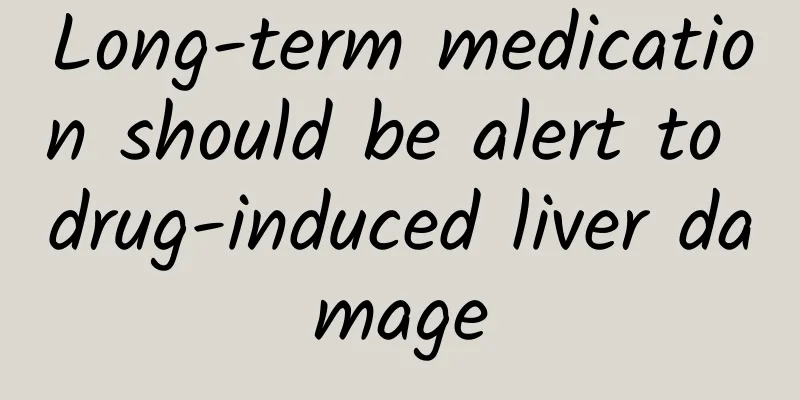Long-term medication should be alert to drug-induced liver damage

|
We have heard that drinking alcohol and staying up late can damage the liver, as well as viral hepatitis such as hepatitis A, B, and C. However, there is a type of drug-induced liver injury that is often overlooked due to insufficient public awareness. Drug-induced liver injury is liver function abnormality caused by drugs and their metabolites stimulating the liver, also known as drug-induced liver injury. In severe cases, it can lead to acute liver failure or even death in patients. Main factors causing drug-induced liver injury 1. Related to the drug itself: Some drugs or their metabolites are toxic to the liver. The greater the dose, the higher the risk of liver damage. 2. It is related to the individual user. Some people are allergic to some drug ingredients, or their drug metabolism is different from that of ordinary people, which can also easily cause liver damage. 3. Related to drug abuse. Not following doctor's orders or taking drugs based on one's own experience increases the probability of liver damage. Wrong medication methods may also harm the liver, such as not "avoiding certain foods" when taking medication, blindly believing in folk prescriptions, and letting children take adult medicines. Chronic disease patients who take medications for a long time and patients with existing liver lesions, as a group prone to drug-induced liver damage, should use medications with caution. Several common types of drug-induced liver injury 1. Antipyretics Take antipyretic analgesics as an example, including acetaminophen, indomethacin, ibuprofen and motrin, etc. If used in excessive dosage, it may increase the risk of liver damage, and in severe cases it may cause toxic liver damage. 2. The most common antibiotics are anti-tuberculosis drugs, such as macrolides. Long-term use will partially affect the patient's liver, leading to decreased liver function and increased liver detoxification pressure. Therefore, antibiotics should not be used indiscriminately and should be used according to doctor's advice. 3. Lipid-lowering drugs There are usually three types of such drugs. Nicotinic acid lipid-lowering drugs do not cause much damage to the liver, while fibrates and statins are more harmful to the liver. Therefore, before using such drugs, patients with cardiovascular diseases must remember to check the liver condition first, and then decide whether to take them according to the doctor's advice. 4. Some stomach medicines can improve stomach discomfort symptoms, such as ranitidine, cimetidine, metoclopramide, etc. Long-term use may cause toxic liver damage or even fatty liver. 5. Diet pills Many diet pills contain toxic ingredients. If used for a long time and in large quantities, they may damage the liver and lead to a series of liver diseases. 6. About 15% of drug-induced liver injuries are caused by improper use of traditional Chinese medicine, which includes Chinese herbal medicines such as Achyranthes bidentata, Radix Polygoni Multiflori, and Chinese patent medicines such as Xiaohe Tablets, Yinqiao Tablets, and Liushen Pills. The following symptoms may be drug-induced liver injury 1. Dry retching, fatigue, nausea If the patient has symptoms such as dry retching, fatigue and nausea, and has been taking the above-mentioned drugs that are prone to drug-induced liver injury for a long time, the medication should be stopped immediately. Some patients may feel bloating and indigestion during the medication stage, and treat it as a stomach disease, but there is no improvement. In fact, this is also caused by liver damage. It's just that its symptoms are too similar to some symptoms of stomach disease. 2. Darker urine and yellow face Patients find that the urine color suddenly becomes darker and the face turns yellow, showing symptoms of jaundice. If there are no other diseases, it can be judged as a symptom of drug-induced liver injury. 3. The wound does not stop bleeding. The patient's wound does not stop bleeding, such as nose bleeding. This symptom may also be drug-induced liver injury, and the condition is already serious. You should go to the hospital for treatment immediately. This is because the liver is both a metabolic organ and an important organ for synthesizing coagulation factors. After the liver is damaged, it is difficult to produce coagulation factors, resulting in continuous bleeding. In addition, many drug-induced liver injuries have no obvious symptoms in the early stages, and abnormal liver function can only be detected through blood tests. There are two main test indicators. (1) If the transaminase index in the body is higher than the normal value, it indicates that the patient has suffered drug-induced liver injury; (2) Bilirubin is found in the serum, or jaundice symptoms are present. The higher the bilirubin rises, the more serious the liver damage. How to reduce drug damage to the liver Be sure to read the drug instructions carefully before taking the medicine. If it is indicated that patients with impaired liver and kidney function should use it with caution, it means that the drug may harm the liver and kidneys. At this time, you should consult a doctor and let a professional decide whether to switch to other drugs. In addition, the instructions will also explain the number of times to take the drug, the dosage, etc. Be sure to take it as required, otherwise it will increase the burden on the liver and harm the liver. In addition, some drugs may damage the liver if taken for a long time, leading to consequences such as liver necrosis and cirrhosis. In this case, it is necessary to take it together with some liver protection drugs. This also requires consulting a doctor's professional advice to avoid adverse reactions between the two types of drugs, which will harm your body. |
>>: There are five principles of longevity diet
Recommend
Understand chronic sinusitis and win the battle to protect your nasal cavity!
Author: Xia Jiao, deputy chief physician, Beijing...
A complete explanation of myopia surgery! You must know these 10 questions
The animated picture comes from soogif Wearing fr...
Why do high beams shine upwards? How can I adjust the high beams down when they are too high?
High beam is a lamp that is needed for nighttime ...
Causes of continuous menstruation
When it comes to menstruation, I believe most peo...
How many days is the menstrual cycle?
I believe that most female friends are aware of t...
At how many weeks is velamentous placenta dangerous?
Vela placenta is a relatively common symptom. The...
Emergency contraceptive pills pregnancy reasons
In fact, in daily life, many female friends nowad...
Fetal movement decreases slightly at 26 weeks of pregnancy
Pregnancy refers to the presence of one or more f...
Causes of brown discharge during non-menstrual period
We know that female friends sometimes have some b...
How to make fried chicken nuggets crispy and crunchy? What is the best flour to use for fried chicken legs?
Fried chicken is a delicacy that is loved by both...
After giving birth, the fungus disappeared on its own
It is better to have fungus after giving birth, b...
Summer dress
Summer is here, and it's time for pretty girl...
Doctors at Peking Union Medical College said: Visible pain means more accurate treatment! - Visualized ultrasound technology makes pain invisible
Author: Cui Xulei, deputy chief physician of Peki...
What is the matter with rib chest
Rib chest may be caused by congenital development...
Why does the vaginal discharge look like tofu dregs?
Leucorrhea is a normal substance secreted from th...









